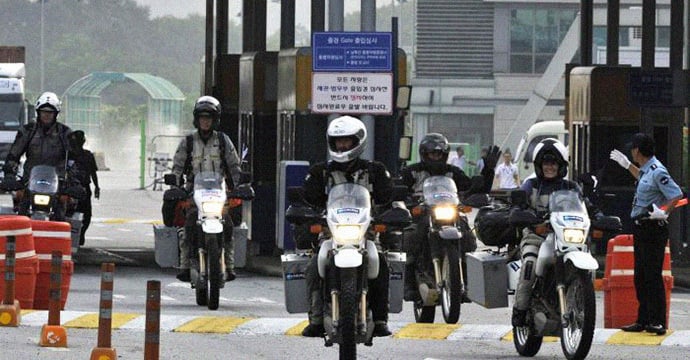
Having become the first people to motorbike across the Korean Peninsula, Gareth and Joanne Morgan have some real insights to share, especially regarding the terrain, the people and the bureaucratic process they’ve witnessed.
A bit of time in the North, as well as some time traveling through its territory has also left them with some opinions on the prospects for reunification.
The Morgans entered the North on August 16, crossing the Tumen River from Russia. They are expected to complete their journey in two weeks , having traveled 5,500 miles before ending at South Korea’s Mt. Halla on Jeju Island.
“We did the whole of Korea from Baekdusan (in the North) to Hallasan,” Gareth told NK News, using the Korean names for Mt. Baekdu and Mt. Halla.
But the hardest part of the journey took place well before that.
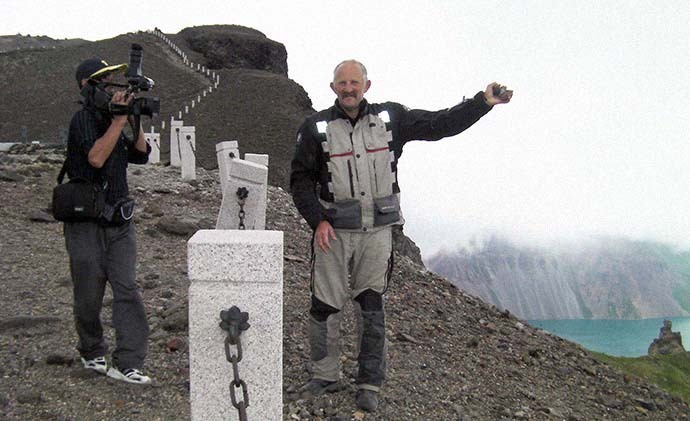
JUMPING THROUGH HOOPS
The Morgans have been riding motorcycles at locations around the world since 2001, having previously been in South Korea on multiple occasions. It was in 2006, though, that they began their dialogue with the North to complete their ambition of motorcycling across the whole of the peninsula.
Not only did they eventually get the North’s permission for the trip, they received the suggestion that they cross into the South at the DMZ, something they had assumed was impossible
Greater bureaucratic obstacles, the Morgans said, came from outside the North.
“We went back to New Zealand and went to the South Korean embassy in NZ and told them, ‘We are riding (across) North Korea,” Gareth said. “Which they didn’t believe.
“So the first response to that was ‘not possible.’”
Negotiations continued, though, and eventually reached as high as South Korea’s president, who approved the trip. After shipping their motorcycle to Magadan, a port town on Russia’s Eastern border, a new set of negotiations began, this time with Russian authorities, as the Morgans needed to enter North Korea by train. On the train ride, they were told that they would have to provide their own wagon for the motorbike, as well as given a price estimate for the trip into the North.
“The Russians were going to charge us more than the whole of trip to North Korea just for one hundred-kilometer (more than 60 miles) train ride,” he said. “Nice people would have given up.”
“We were sitting in Wellington (in New Zealand) and saying this is ridiculous, getting too expensive,” Joanne said. “So I told Gareth that I wouldn’t buy any shoes for the rest of my life.”
Eventually, though, they made arrangements and were on their way to the North. While on the train, though, their passports were taken by North Korean military personnel.
“Didn’t take anyone else (on the train)’s passports,” Joanne said. “Just us; just took the New Zealander’s passports.”
The intent was not sinister, however; their passports were being processed to ensure smooth passage into the North.
“They said, ‘This trip is very important to (the) Koreas,” she said. “So you have an entry into North Korea.”
“And we were VIPs the whole time,” Gareth added. “Pretty awesome.”
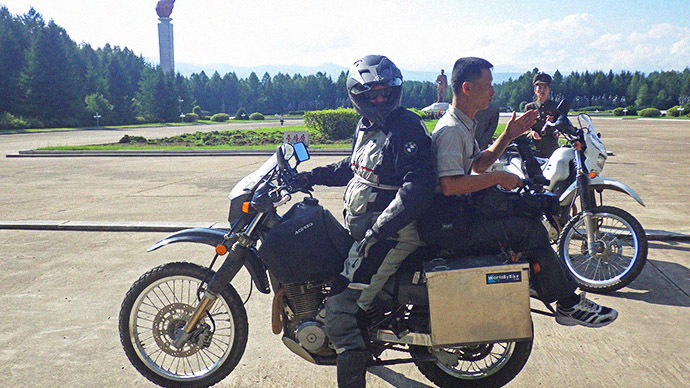
NORTH KOREA’S CHARMS
Once over the border, they were met by a North Korean delegation, as well as their countryman Roger Shepherd, who has carved out his own niche climbing mountains on both sides of the DMZ.
From there, the Morgans got the chance to appreciate the scenic and personal beauty of the international pariah at harvest season.
“There could be problems in the country where we didn’t see,” Joanne said. “So we can’t comment on anything we didn’t see. But what we saw, it was fantastic.“
“The country is beautiful,” Garth said. “The country is just fantastic, the farms are perfect. They have no pollution.”
“You look at their personal gardens, and they have got sunflowers, pumpkin growing over their roof, they (have) tobacco, huge pride in their personal space as well as their communal farms,” Joanne said. While the standard of living is clearly lower than in the South, they said it probably is not much different from South Korea a couple of decades ago, and that those they witnessed were not malnourished or lacking in necessities in clothing or shelter.
Furthermore, they were deeply impressed by the culture, having eaten, conversed and even danced with the locals at a beach party in Hamhung, South Hamgyeong province.
“They are just ordinary people,” said Joanne, who speaks some Korean. “They are affected by the politics but most people don’t want to talk about the politics all the time. They want to know are you enjoying your food.”
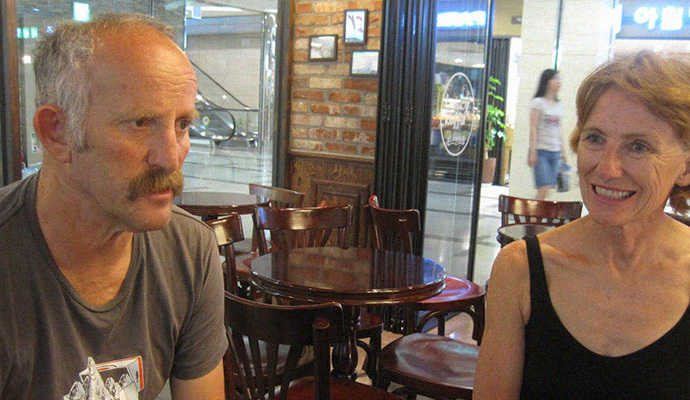
The couple recalled the people as very friendly wherever they went in the North, and even using a little bit of English.
“So they had said thank you, hello, goodbye, you are welcome,” she said. “You are going through the village and (in) one of the village in particular, one old lady was waving me up and saying, ‘Hello, thank you for coming.’ This is random people just in the village and they were working. So there’s a big feeling of wanting to engage.”
Gareth said that the North Korean government was very supportive of their trip throughout its duration, and believes that this is because they look the inter-Korean bike trip as a way of improving relations. The Morgans themselves hope that they won’t be the first to undergo the trip across the Korean Peninsula.
“If I can do it, why the hell can’t Koreans do this?” he said. “This is crazy, it is their country.
“So, hopefully, we just make a little dent and the people can make a difference.”
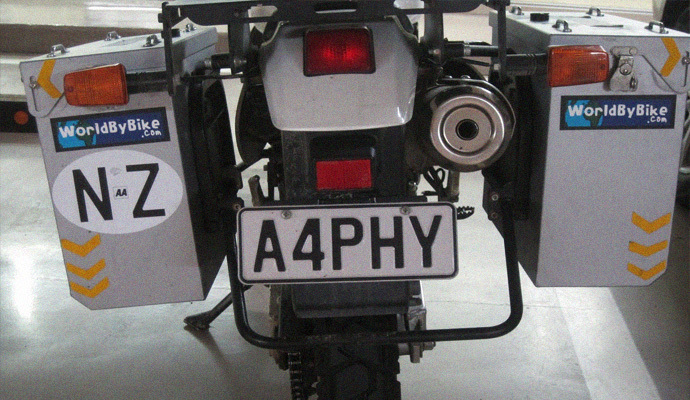
MOTORCYCLING FOR PEACE
The Morgans are convinced that the North not only granted the request, but suggested the DMZ as an entryway because they want better ties with the South.
“Absolutely, there’s no doubt about it,” Gareth said. “Both of the countries have Ministries of Reunifications…They are brothers and sisters.”
Still, they know it takes more than intent to unify peoples who have lived under two states as different as the South and the North.
“It’s not going to be easy because South Korea is a liberal democracy,” he said. “You have personal freedom like you do in New Zealand. I can say whatever I like. I can go wherever I like. I can associate with whoever I like. And I can get whoever I like to represent me at the parliament.
“(North Korea has) none of those. So it’s a completely different regime. So how can (they) go together without one dominating the other? It’s impossible.”
In many of their previous motorcycling trips, the Morgans took part in aid projects and community works. For this trip, he said their objective was different.
“I am just using motorcycle as a vehicle, it’s a platform to talk about what’s the most urgent issue is here,” Gareth said. “So on this trip though, coming to North Korea, what’s the obvious problem? It’s actually this, the state of war between the two countries. So I don’t personally think North Korea needs aids. What it need is peace and I think South Korea wants peace too.”
The start of that journey, he said, is for the two sides to guarantee their own security – with the North assisted by China and the South by the U.S. – while toning down the rhetoric and aggression.
“We all agree democracy is the better system,” he said. “If we force the regime changes, what happens is…escalation, for worse not better.”
“Frankly I don’t see the DPRK regime through any different lens than I see China, Russia, Saudi Arabia, Malaysia – even Singapore at times – authoritarian regimes all of them,” he added.
“Yet with all but the DPRK we enjoy investment, trade and social relations. Double standards perhaps?”
“It was sobering to ride along Stalin’s road of bones where all those political prisoners died as a prelude to the DPRK ride – just reminded me of who our erstwhile ally in WW2 really was.”
Interview conducted by Susan Ahn and Shinui Kim in Seoul, Saturday August 30
Pictures: S. Ahn, S. Kim, G. Morgan
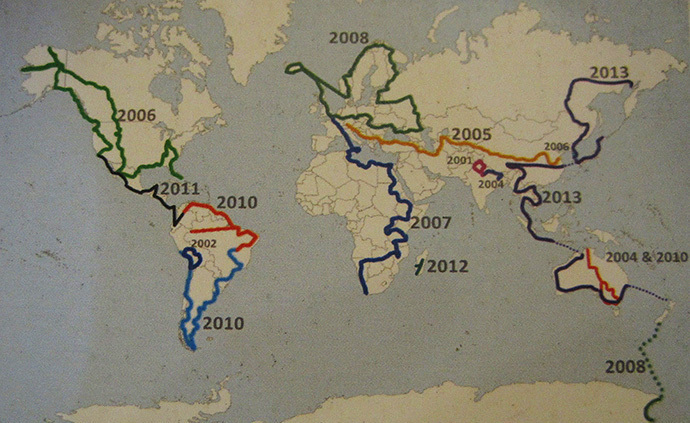
Route map shows the Morgan’s previous bike rides

Comments are closed.